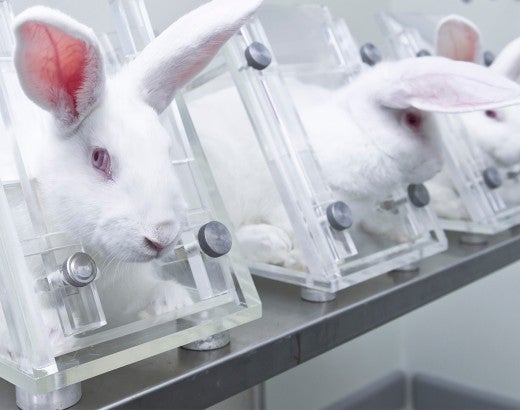The hurt and harm of animal testing can extend beyond what happens in laboratories, as a new scandal concerning one major animal testing company’s acquisition of monkeys shows.
The U.S. Securities and Exchange Commission is investigating whether Inotiv and several of its subsidiaries violated the U.S. Foreign Corrupt Practices Act in efforts to source monkeys from Asia for use in their animal testing facilities and to sell to other laboratories. The Wall Street Journal recently reported that Cambodian officials were allegedly paid to hand out permits stating that wild long-tailed macaques (captured in national parks and protected wild habitats) were bred in captivity. According to prosecutors, this alleged criminal conspiracy went on for about four years.
Last November, several employees of Inotiv’s main supplier of monkeys were charged by federal prosecutors with involvement in a criminal conspiracy. Two officials of the Cambodian government were also charged. The case is currently pending.
We are familiar with Inotiv because of our 2022 undercover investigation, which showed the plight of dogs and other animals used as test subjects at the company’s testing lab in Indiana, and because Inotiv is the parent company of Envigo, which owned and operated the breeding facility from which we removed nearly 4,000 beagles last summer, following the discovery of Animal Welfare Act violations by the U.S. Department of Justice.

Long-tailed macaques can only be imported into the U.S. with special permits because they are protected under the Convention on International Trade in Endangered Species of Wild Fauna and Flora (CITES). In this case, it isn’t just these illegally imported monkeys who have been wronged: Using these animals in experiments has been identified as a major threat to the survival of their species. If corporations, governments and institutions persist in animal testing, with the expectation that animal welfare organizations pick up the pieces by taking measures to preserve endangered populations or providing lifelong care to animals displaced, discarded or retired from laboratories, this will only exacerbate the problems to both humans and animals without treating the root cause of the cruelty and inefficiencies in this system.
Inotiv and its subsidiaries have a history of disregarding animal welfare at their testing and breeding facilities, which house tens of thousands of beagles, monkeys and other animals. As recently as July 12, Bronco Research Services—a subsidiary of Inotiv located in Fort Collins, Colorado—was cited for Animal Welfare Act violations for putting beagles in cages smaller than the required minimum size and using cage flooring that allowed beagles’ feet to become stuck and injured. The U.S. Department of Agriculture has directed Inotiv to correct the violations.
Last year, Inotiv subsidiary Envigo was sued by the U.S. Department of Justice after its mass breeding facility in Cumberland, Virginia, was cited for dozens of Animal Welfare Act violations, including failing to document the cause of death for hundreds of puppies, euthanizing dogs without anesthesia and providing inadequate veterinary care and insufficient food. We recently celebrated the one-year anniversary of the start of our operation to remove nearly 4,000 beagles from the facility. If not for this historic transfer, most of these dogs were bound for animal testing laboratories. Instead, we placed them with more than 100 shelter and rescue partners around the country to find loving homes. The breeding facility is now closed.
We also conducted a seven-month undercover investigation at Inotiv’s Indiana laboratory, where more than 6,000 dogs, monkeys, minipigs, mice and rats were being used in deadly tests. During the investigation, two long-tailed macaques who were not being adequately supervised accidentally hanged themselves while being restrained during an experiment. We documented numerous other possible violations of the Animal Welfare Act.
We are now at a crossroads. Proponents of the status quo are calling for the government to invest tens of millions of taxpayer dollars to breed more monkeys for U.S. laboratories. We see things differently. Instead of propping up an outdated industry, the federal government should be investing those funds into expanding the toolbox of modern non-animal technologies. Cutting-edge micro-physiological systems and computer modeling are just two examples of these approaches, which are becoming increasingly accurate (often more so than animal experiments) in identifying chemical and drug hazards to ensure products are safe and effective for people. Investing taxpayer dollars in more animal testing infrastructure is taking the U.S. backward, not forward. The Environmental Protection Agency, Food and Drug Administration, and other regulatory and research agencies have made strides to move away from animal testing in some areas, but change needs to come faster, with redirected and increased funding for accelerating the transition away from animal experiments, a move that the public already strongly supports.
Sara Amundson is president of the Humane Society Legislative Fund.



